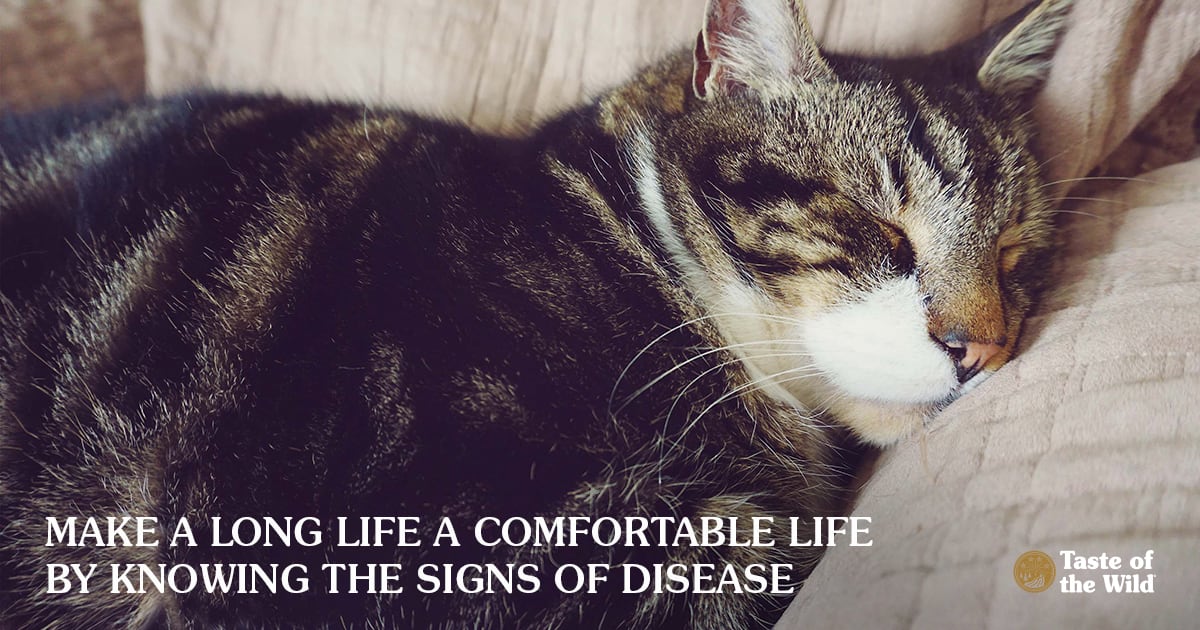
A cat named Creme Puff holds the world record for “oldest cat,” slinking past her 38th birthday by three days. While most cats don’t have that kind of longevity, advances in nutrition and veterinary medicine are helping felines live longer than ever before. And with the right care, maybe your kitty will make it into the record books, too!
One way you can help make that happen is to schedule regular veterinary checkups. For senior cats who are roughly 11 years of age and older, it’s generally recommended to visit the veterinarian at least twice a year. That way, your veterinarian is more likely to catch health problems early, when they may be more amenable to treatment (not to mention often less expensive to treat).
Know the Subtle Signs
Unlike some dogs, who can be melodramatic when they’re feeling under the weather, cats typically suffer in silence. That’s why it’s important for you to recognize the subtle signs of illness, which can include:
- Unexpected changes in weight
- Increase or decrease in appetite
- Drinking and urinating more than usual
- Reluctance to jump on furniture or use stairs
- Reduction in grooming and other activities
To complicate matters, many conditions older cats face have similar signs, and cats can have more than one health issue at once. That’s why your veterinarian may recommend blood and urine testing, blood pressure testing, X-rays and other diagnostics to help pinpoint the problem. Here are some of the more common health conditions in older cats.
Kidney Disease
When kidney function diminishes, cats typically drink more water and, as a result, leave larger quantities of urine in the litter box. They may be less interested in food, which causes them to lose weight.
If caught early through blood and urine testing, it’s possible to help slow the progression of the disease with therapeutic diets. It’s also important to help your cat stay hydrated. Plug-in drinking fountains for cats may spark your feline’s curiosity and encourage drinking. And canned food, which has higher water content than dry, can help, too. In more advanced cases, administering subcutaneous fluids regularly can make a noticeable difference in your cat’s happiness factor.
Hyperthyroidism
An overactive thyroid can lead to a surplus of thyroid hormones, resulting in a kitty with an abnormally high metabolism. Your cat may seem more active than usual and may lose weight despite demanding that you fill the food bowl more often. Cats with hyperthyroidism may also have bouts of vomiting or diarrhea.
Hyperthyroidism is typically diagnosed with a blood test. A number of treatments are available, including special diets, daily oral pills and radioactive iodine treatment, which usually eliminates the problem permanently.
Diabetes
Overweight older cats may be more prone to diabetes, especially males. Signs of diabetes include an increase in both thirst and urination. Cats will often lose weight even though they’re usually eating more.
A blood and urine test can help pinpoint the problem. Treatment usually includes a special diet and insulin injections. If caught early and treated aggressively, some cats can go into remission and may no longer need insulin.
Arthritis
Have you noticed that your cat avoids using the stairs or no longer leaps up onto your bed? It’s quite possible that your cat has achy joints associated with arthritis.
If your senior cat is overweight, shedding a few pounds can help put less stress on joints and relieve much of the pain. Your veterinarian may also recommend supplements that may help. Consider adding litter boxes with lower sides that are easier to step over, on every floor. By placing ramps or carpeted pet steps, you can make it easier for your cat to climb onto the couch with you for a little snuggle time.
Dental Disease
It probably comes as no surprise that cats who are long in the tooth often have painful dental problems, too. Red or bleeding gums, drooling, bad breath, missing teeth and loss of appetite can be signs of dental disease. Regular veterinary dental cleanings, at-home dental care and dental diets can help prevent dental disease.
Because you see your cat every day, you’re the best one to notice subtle changes in your senior cat. When you do, schedule an appointment with your veterinarian. Together, you can make a plan to help your cat stay healthy for as long as possible.
RELATED POST: Every Cat Needs Routine Veterinary Care
The information in this blog has been developed with our veterinarian and is designed to help educate pet parents. If you have questions or concerns about your pet's health or nutrition, please talk with your veterinarian.
